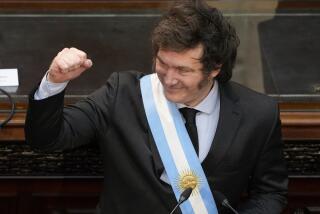DEA Chief’s Visit Fuels Hope for Better Ties
- Share via
BOGOTA, Colombia — Colombians saw new hope for improving their embittered relations with the United States in this week’s brief visit by Thomas A. Constantine, the head of the U.S. Drug Enforcement Administration.
Yet Constantine’s whistle-stop Thursday also clearly indicated that the prospect of reconciliation does not extend to President Ernesto Samper, whose 1994 election campaign has been the target of persistent accusations that it was financed in part by drug money.
Constantine’s 9-to-5 agenda on his first visit to Colombia did not include a stop at the office of Samper, whose U.S. visa was revoked last year. The president told reporters that he could “not meet with every official who comes to the country.”
Instead of seeing the president, Constantine laid a wreath on a monument honoring the hundreds of Colombian police killed fighting drug traffickers. Constantine--a former New York police officer--said, “In this fight, no country has suffered more or has sacrificed more than Colombia.”
The speech was considered noteworthy in a country that for two years has been on Washington’s list of pariah nations that do not cooperate fully in the war against narcotics. Colombia was rocked by drug-related violence early in this decade and most recently has been suffering from a recession that many economists believe is related to efforts to wean its economy from dependence on drug money.
“We in the United States are especially grateful for everything you have done,” Constantine said, making it clear that his comments referred to the Colombian people and police, not the Samper administration.
Coming one day after similar congratulations from a U.S. congressional delegation and shortly after the Clinton administration decided to provide $40 million in military aid to Colombia--in addition to $45 million in already approved anti-drug aid--Constantine’s words were seen here as a sign of reconciliation between the two nations.
One Colombian radio announcer said ecstatically on the air, “This is the highest praise that the Colombian police have ever received--perhaps in their entire history.”
Defense Minister Gilberto Echeverri Mejia, who attended the ceremony, said Constantine’s remarks were encouraging. “Finally, we are receiving some recognition for our efforts,” he said in an interview later that day.
Constantine also met with the justice and foreign ministers as well as top law enforcement officials, following Washington’s tacit policy of maintaining relations with Colombia while dissociating itself from Samper.
Relations between the two countries have been strained by revelations that dozens of Colombian elected officials have ties to drug lords. Many of those officials, including Samper’s 1994 campaign treasurer and campaign manager, are now in jail and have accused him of knowingly accepting drug money. Congress cleared the president of those charges last year.
Further, the Colombian armed forces’ dismal human rights record has provoked strong objections from activist groups and some U.S. congressional representatives to continued military aid to this country. The army is involved in anti-drug efforts that include attacks on guerrillas who are financed in part by the narcotics trade.
Still, Colombian cooperation is crucial to the U.S. anti-drug fight because this country supplies huge amounts of the cocaine shipped to the United States. It is also blamed for providing a growing amount of the heroin arriving in the U.S., especially on the East Coast.
During his visit, Constantine signed a cooperation agreement that will create a new police task force specifically designated to fight heroin production.
Meanwhile, authorities said Friday that suspected leftist rebels killed a Liberal Party senator and staunch ally of Samper in northeastern Colombia.
A local military commander blamed the attack on National Liberation Army guerrillas who are waging a campaign to disrupt elections scheduled for late this year and early next year.
Jorge Cristo, 67, was shot six times as he entered his office. He was one of the leading Liberal Party politicians who persuaded Samper to run for the presidency in 1994. He later defended Samper against accusations that he had received millions of dollars in donations from the Cali drug cartel to help fund his campaign.
More to Read
Sign up for Essential California
The most important California stories and recommendations in your inbox every morning.
You may occasionally receive promotional content from the Los Angeles Times.










